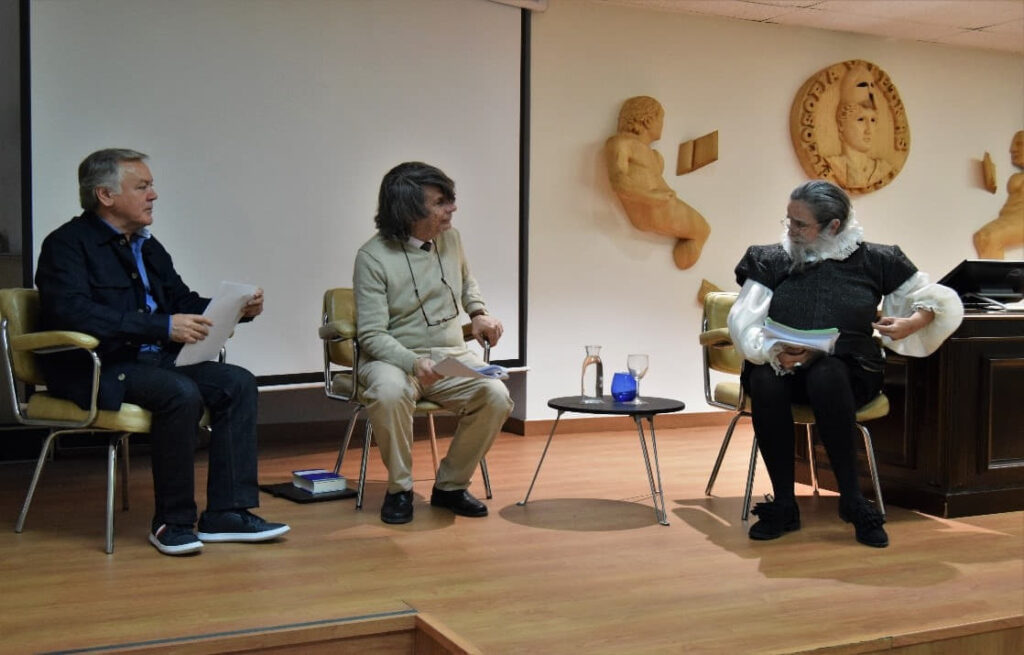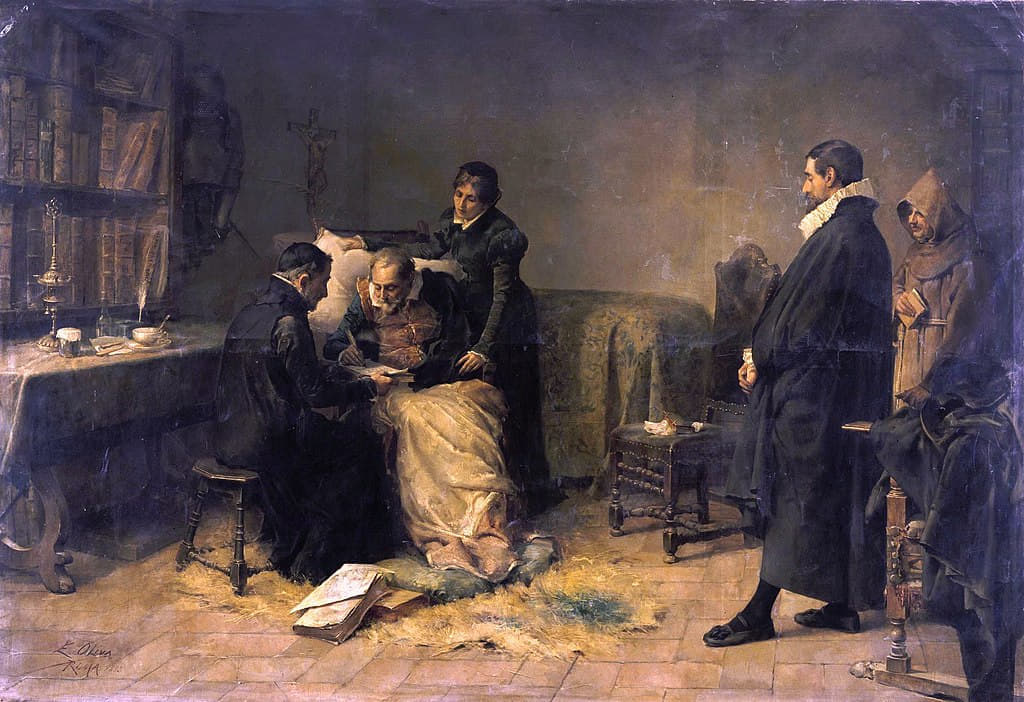An invitation to reflect on the love for the Humanities.
The meritorious writer, Eduardo Aguirre Romero, who is an on humor in Cervantes and is very much a humorist in his own right, has written a remarkable book. humor Eduardo Aguirre Romero, himself very much a humorist, author of the remarkable books, Vivan las Humanidades, siempre vivas (Long live the Humanities, Ever Living). Previously, he has written, Cervantes, enigma del humor (Cervantes, Enigma of Humor), Cine para caminar (Cinema to Walk With), Blues de Cervantes (Cervantes Blues), and Entrevista a Cervantes (Interview with Cervantes). His latest book was brought to the stage as a “dramatized conference,” at the Aula Magna of the Faculty of Philosophy and Letters, at the University of León, during the institute’s joyful patron saint festivities for San Isidoro on April 18, 2023. The book includes a foreword by Professor José Montero Reguera, Dean of the Faculty of Philology and Translation at the University of Vigo.
The leading parts at the “dramatized conference” were played by:
- Juan Matas Caballero, Professor and Corresponding Academician of the Royal Academy of Sciences, Fine Arts and Noble Arts of Córdoba, who has recently edited the magnum opus, Sonetos de Luis de Góngora (Sonnets of Luis de Góngora);
- Marta Roa , the former Dean of the Faculty of Philosophy and Letters, University of León, (who is actually the wife of Eduardo Aguirre Romero; this fact actually serves as a gag within a gag in the dramatized lecture);
- Ángeles Rodríguez the renowned Mexican actress;
- Juan Álvarez Iglesias, student at the Faculty and Letters;
- Siro López Lorenzo, the essayist (such as, “Epilogue;” “Letter to Krzysztof Sliwa”), who is one of the most important Spanish graphic humorists and caricaturists;
- Marcelo Tettamanti and Pedro Fergar, poets both of photography.
In his Prologue, the renowned Cervantes scholar Montero Reguera correctly observes that the role of a Dean of Humanities “is a very laborious job, not given to leisure, in which very curious and sometimes unthinkable things are dealt with… since it is up to us—philologists, philosophers, historians—to make our society capable of looking to the future with an open, expectant, curious, responsible vision.”

Reguera rightly suggests that the “theatrical” Eduardo Aguirre Romero explains very well the role of a Dean of the Humanities in our very difficult times and alludes to his teacher the philologist Alonso Zamora Vicente (1916-2006)—who was also the teacher of the Peruvian writer, Mario Vargas Llosa (1936-) who was awarded the Nobel Prize for Literature (2010), and from whom Reguera quotes these words:
The young Spaniard must always be in the flesh, before Cervantes’ criticism of the society in which he lives, and learn from him the position that an intellectual must maintain in the face of the ever-changing socio-political structures; he must be in the vanguard of them, in permanent constructive opposition, marking an ethic and an inextinguishable desire for improvement” (Vivan, pp. 14-15).
Reguera agrees with Aguirre, and states that
The humanities are fundamental for being human, enriching to the highest degree, but also fun, a lot of fun: the stuff composed by Matas and Aguirre that ended up becoming a gangarilla, with the intervention of a certain de Saavedra [Cervantes], in the guise of Ángeles Rodríguez proves it. Come in, come in and read Aguirre, you will have a good time, and yes, you will end up shouting, with conviction, ‘Long Live the Humanities!’ (Vivan, p. 15).
Moving forward in time, let us now focus on the “dramatized conference,” which is the heart of the play, and in whose theatrical representation the members participate. They are Juan Mata Caballero, Eduardo Aguirre Romero, the Lady (Marta Roa), Miguel de Cervantes (Ángela Rodríguez), and Pancracio de Roncesvalles (Juan Álvarez Iglesias). They profess the challenges of the Humanities in this way:
Aguirre:
“They say that bad winds are blowing for our beloved Humanities… but when have good times ever blown for it?
“Tell me, which times have been good for the Humanities? And for the human?
“Finally, ask your parents or your grandparents about difficult times. Difficulty is part of the test, in studies and in professions, even in love and in life. This is what this minstrel of columns tells you.
“Who has seen many towers fall that I never imagined I would see fall. But I also see others rise. Raise your own towers, be builders of your reality and not mere passive objects of what they want to impose on you. It is not easy. But it never was.
“And yes, how can you deny it: an economic crisis that does not end… the conflict in Ukraine that puts it at risk.
“New totalitarian fascinations, right and left… a crisis of the Spanish educational system—not caused by teachers—that links with the previous one and the previous one and the previous one… the majority’s disaffection towards culture;
“All this is true, but it is not the only truth. Participate in the combat of values in which we have put you… and win it in our name” (Vivan, pp. 19-23).
Indeed, Aguirre emphasizes that “Humanities studies are the master pillar on which civilization has built the best of itself” (Vivan, p. 24). However, despite the crisis of the Humanities, Aguirre writes with elegance and appeals to students, teachers and amateur enthusiasts: “Yearn for excellence, as a first step to achieve that solid formation which must be the shield;” and “overcome the threats with the weapons of our values, but also of your academic formation” (Vivan, p. 26), because “a society without Humanities taught in public education would mean that the only criteria would be economic ones, in the name of what they call professional opportunities. Of course, and when there are not, create them. Let’s say it now, today Culture as we know it, which is not one but the sum of many, is also in danger. We cannot deny the obvious” (Vivan, p. 29).
Alongside this, in defense of the Humanities, Aguirre, who is a columnist for the Diario de León, resurrects Miguel de Cervantes Saavedra, King of Spanish Literature, mentions some notorious examples throughout his work, and appeals to students in this way:
In this good fight, it is not enough to be enrolled, or to have tiptoed through it. Nor is it enough to save yourself by the skin of your teeth. Allow me to insist… yearn for excellence, yearn for it with joy and passion. Have a voracity for knowledge…. You are in a wonderful stage in which your main obligation is to train yourselves. You will never have so much time for it again. These years are your foundation for the future” (Vivan, pp. 29-31).
To further reinforce his opinion of the Humanities, despite the challenges, Aguirre (himself a member of the Cervantistas Association) teaches the reader the power of the Humanities, which are valuable not only valuable for men of letters, but constitute pearls of wisdom from the genius of universal literature. Thus, Aguirre deduces that “Cervantes and his most universal masterpiece have an enormous formative power, without the need to take it to nineteenth-century distortions or to mutate it into a lackey of May ’68” (Vivan, p. 49). Aguirre, with his deep curiosity, emphasizes a great honesty:
Aguirre: The Humanities are not only what you know, but also—or above all—what you do” (Vivan, p. 33);
and then he rightly recommends this course of action:
Cervantes- “TRAIN yourselves… CREATE yourselves… BUILD yourselves… WRITE yourselves… READ… LISTEN… In short, FIGHT… for what is yours, which belongs to everyone. And also, of course… LAUGH… LOVE… SING…” (Vivan, p. 38).
It is also important to state that it is a great honor and privilege for me to give you my sincere thanks for defending the Humanities through theater, and to congratulate the playwright Eduardo Aguirre Romero, sincere believer, effective observer of reality and versatile writer, for his magnificent theatrical work, a scenic landmark of the Humanities, which illustrates the fundamental values of sincere love and true sacrifice, won with love, pain and humor, oriented to all humanity. My congratulations I also extend to all the theatrical characters, and to the exemplary editorial achievement, in a work designed to be distributed free of charge among teachers and students, as it is already being done. My warmest congratulations to all!
It should be emphasized that the gag that closes the book, that the Quixote delivered by Aguirre to Cervantes for his signature is by mistakenly the apocryphal one (1614), so by Alonso Fernandez de Avellaneda, at least in the edition of the Royal Spanish Academy, and is a tribute to the meritorious professor Luis Gomez Canseco, of the University of Huelva. At the same time, I emphasize that it is only right to be grateful for the dedication that the author makes to me and for the letter he sends me at the end of the book.
Without the slightest shadow of a doubt, Eduardo Aguirre proclaims unconditional love and aesthetic, human, personal, social and universal values through his unwavering pen for the Humanities, which contribute decisively to the more humane formation of the global citizen, but which gradually tend to be conspicuous by their absence in university classrooms.
Aguirre, who loves humanity, reflects the current situation of the humanities around the world through his characters and themes. He relies on wise and healthy humor, because weise Wörter sind gesund—thus he captures the reader’s soul, and invites us to defend the Humanities and make us better human beings.
In conclusion, the masterpiece, Vivan las Humanidades, siempre vivas, illuminates the path of our heart; it beautifies us spiritually, and proves that it is beneficial and indispensable to serve by leading and loving the Humanities and all Humanity. Congratulations to all!
Krzysztof Sliwa is a professor, writer for Galatea, a journal of the Sociedad Cervantina de Esquivias, Spain, and a specialist in the life and works of Miguel de Cervantes Saavedra and the Spanish Golden Age Literature, all subjects on which he has written several books. He has also published numerous articles and reviews in English, German, Spanish and Polish, and is the Corresponding Member of the Royal Academy of Cordoba and Toledo.
Featured: Cervantes writes the dedication of Don Quixote to the Count of Lemos, by Eugenio Oliva Rodrigo; painted in 1883.
